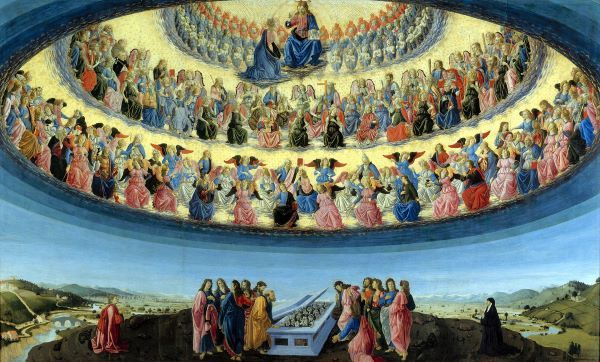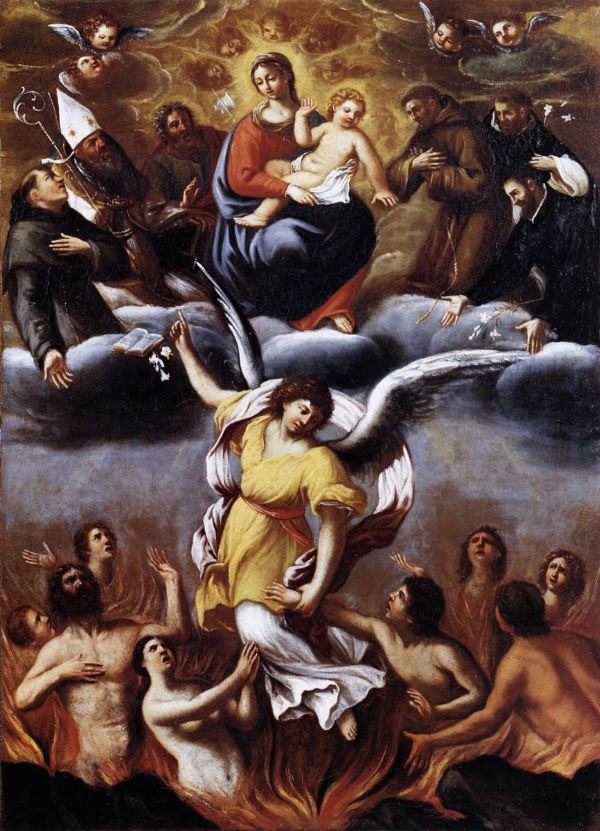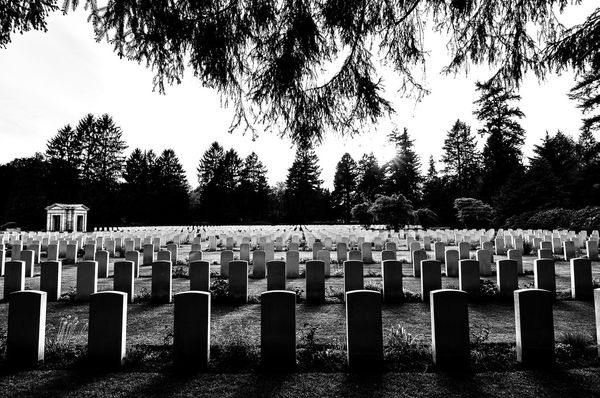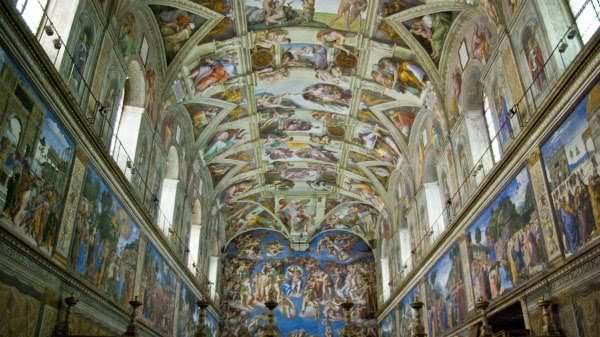Through the liturgy of the month of November, the Church invites us to meditate on the realities we will confront at the end of life: death, judgement, and eternal destiny.
1. What happens after death? Does God judge each person?
2. Who goes to Heaven? What is it like?
3. What is Purgatory? Is it forever?
5. What is the Last Judgement? When will it be?
6. What can we expect in the promised "new heaven and new earth"?
7. Why do we pray for the dead?
1. What happens after death? Does God judge each person?
The Catechism of the Catholic Church teaches that "death puts an end to human life as the time open to either the acceptance or rejection of the divine grace manifested in Christ."
"Each man receives his eternal retribution in his immortal soul at the very moment of his death, in a particular judgment that refers his life to Christ: either entrance into the blessedness of heaven — through a purification or immediately — or immediate and everlasting damnation." St. John of the Cross writes, "At the evening of life, we shall be judged on our love." (Catechism of the Catholic Church, 1021-1022)
Meditate with Saint Josemaría
- Everything can be put right... except death. And death puts everything right. (Furrow, 878)
- When facing death, be calm! I do not want you to have the cold stoicism of the pagan, but the fervour of a child of God who knows that life is changed, not taken away. —Dying?... Living! (Furrow, 876)
- Don’t make a tragedy out of death, for it is not one. Only unloving children do not look forward to meeting their parents. (Furrow, 885)
- A true Christian is always ready to appear before God. Because, if he is fighting to live as a man of Christ, he is ready at every moment to fulfil his duty. (Furrow, 875)
- 'I was amused to hear you speak of the "account" that our Lord will demand of you. No, for none of you will he be a judge — in the harsh sense of the word; he will simply be Jesus.' These lines, written by a good bishop, have consoled more than one troubled heart, and could well console yours. (The Way, 168)
2. Who goes to Heaven? What is it like?
Heaven is "the ultimate end and fulfillment of the deepest human longings, the state of supreme, definitive happiness." Saint Paul writes: "What eye has not seen, and ear has not heard, and what has not entered the human heart, God has prepared for those who love him" (1 Cor 2:9).
"Those who die in God's grace and friendship and are perfectly purified live for ever with Christ. They are like God for ever, for they 'see him as he is,' face to face.

"This perfect life with the Most Holy Trinity — this communion of life and love with the Trinity, with the Virgin Mary, the angels and all the blessed — is called 'heaven.' Heaven is the ultimate end and fulfillment of the deepest human longings, the state of supreme, definitive happiness.
"To live in heaven is 'to be with Christ.' The elect live 'in Christ,' but they retain, or rather find, their true identity, their own name. They live in God, they see him as he is. They are forever with Christ. They are forever like God, they enjoy his happiness, his Good, the Truth and the Beauty of God." (Catechism of the Catholic Church, 1023-1026, 1023-1026)
Meditate with Saint Josemaría
- Men lie when they say 'forever' in temporal matters. The only true forever, in the complete sense, is the forever of eternity. —And that is the way you have to live, with a faith that brings a foretaste of the sweet honey of Heaven whenever you think about that eternity which is truly everlasting." (The Forge, 999)
- Think how pleasing to God Our Lord is the incense burnt in his honour. Think also how little the things of this earth are worth; even as they begin they are already ending. In Heaven, instead, a great Love awaits you, with no betrayals and no deceptions. The fullness of love, the fullness of beauty and greatness and knowledge... And it will never cloy: it will satiate, yet still you will want more." (The Forge, 995)
- But if we transform our temporal projects into ends in themselves and blot out from our horizon our eternal dwelling place and the end for which we have been created, which is to love and praise the Lord and then to possess him for ever in Heaven, then our most brilliant endeavours turn traitor, and can even become a means of degrading our fellow creatures. Remember that sincere and well-known exclamation of St Augustine, who had such bitter experience when God was unknown to him and he was seeking happiness outside God: 'You have made us for yourself, O Lord, and our hearts are restless till they rest in you!'" (Friends of God, 208)
- In our spiritual life, we often have to be ready to lose on earth so as to win in Heaven. This way we always win." (The Forge, 998)
3. What is Purgatory? Is it forever?
"All who die in God's grace and friendship, but still imperfectly purified, are indeed assured of their eternal salvation; but after death they undergo purification, so as to achieve the holiness necessary to enter the joy of heaven. The Church gives the name Purgatory to this final purification of the elect, which is entirely different from the punishment of the damned.
"This teaching is also based on the practice of prayer for the dead, already mentioned in Sacred Scripture: "Therefore [Judas Maccabeus] made atonement for the dead, that they might be delivered from their sin." From the beginning the Church has honored the memory of the dead and offered prayers in suffrage for them, above all the Eucharistic sacrifice, so that, thus purified, they may attain the beatific vision of God. The Church also commends almsgiving, indulgences, and works of penance undertaken on behalf of the dead." (Catechism of the Catholic Church, 1030-1032)

Meditate with Saint Josemaría
- Purgatory shows God’s great mercy and washes away the defects of those who long to become one with Him. (Furrow, 889)
- You shouldn’t want to do things to gain merit, nor out of fear of the punishments of purgatory. From now on, and always, you should make the effort to do everything, even the smallest things, to please Jesus. (The Forge, 1041)
- 'This is your hour; this is the reign of darkness.' So the sinful man has his hour? Yes...and God his eternity! (The Way, 734)
4. Does Hell exist?
"To die in mortal sin without repenting and accepting God's merciful love means remaining separated from him for ever by our own free choice. This state of definitive self-exclusion from communion with God and the blessed is called 'hell.'
"Jesus often speaks of 'Gehenna,' of 'the unquenchable fire' reserved for those who to the end of their lives refuse to believe and be converted, where both soul and body can be lost.
"The teaching of the Church affirms the existence of hell and its eternity. Immediately after death the souls of those who die in a state of mortal sin descend into hell, where they suffer the punishments of hell, 'eternal fire.' The chief punishment of hell is eternal separation from God, in whom alone man can possess the life and happiness for which he was created and for which he longs." (Catechism of the Catholic Church, 1033-1036)
Meditate with Saint Josemaría
- Don't forget that it is more comfortable (though it is a mistake) to avoid suffering at any cost, with the excuse of not wanting to hurt others. This inhibition often hides a shameful escape on our part from suffering, since it isn't usually pleasant to correct someone in a serious matter. My children, remember that hell is full of closed mouths. (Friends of God, 161)
- A disciple of Christ can never think as follows: “I try to be good; as for others, if that’s what they want... let them go to hell.” Such an attitude is not human. Nor is it in keeping with the love of God, or with the charity we owe our neighbour. (The Forge, 952)
- Hell alone is a punishment for sin. Death and judgement are only consequences, which those who are in the grace of God do not fear. (Furrow, 890)
5. What is the Last Judgement? When will it be?
"The resurrection of all the dead, 'of both the just and the unjust,' will precede the Last Judgment. This will be 'the hour when all who are in the tombs will hear [the Son of man's] voice and come forth, those who have done good, to the resurrection of life, and those who have done evil, to the resurrection of judgment.' Then Christ will come 'in his glory, and all the angels with him. ... Before him will be gathered all the nations, and he will separate them one from another as a shepherd separates the sheep from the goats, and he will place the sheep at his right hand, but the goats at the left. ... And they will go away into eternal punishment, but the righteous into eternal life.'
"In the presence of Christ, who is Truth itself, the truth of each man's relationship with God will be laid bare. The Last Judgment will reveal even to its furthest consequences the good each person has done or failed to do during his earthly life.
"The Last Judgment will come when Christ returns in glory. Only the Father knows the day and the hour; only he determines the moment of its coming. Then through his Son Jesus Christ he will pronounce the final word on all history. We shall know the ultimate meaning of the whole work of creation and of the entire economy of salvation and understand the marvelous ways by which his Providence led everything towards its final end. The Last Judgment will reveal that God's justice triumphs over all the injustices committed by his creatures and that God's love is stronger than death.
"The message of the Last Judgment calls men to conversion while God is still giving them 'the acceptable time, ... the day of salvation.' It inspires a holy fear of God and commits them to the justice of the Kingdom of God. It proclaims the 'blessed hope' of the Lord's return, when he will come 'to be glorified in his saints, and to be marveled at in all who have believed.'" (Catechism of the Catholic Church, 1038-1041)
Meditate with Saint Josemaría
- When you think about death, do not be afraid, in spite of your sins...For he already knows that you love him... and what stuff you are made of. —If you seek him, he will welcome you as the father welcomed the prodigal son; but you have to seek him! (Furrow, 880)
- “I know some men and women who don’t even have the strength to ask for help”, you tell me with sorrow and disappointment. —Don’t leave them in the lurch. Your desire to save yourself and them can be the starting point for their conversion. Furthermore, if you think about it carefully you will realise that someone also had to lend you a hand. (Furrow, 778)
- The world, the flesh and the devil are a band of adventurers who take advantage of the weakness of that savage you bear within you, and want you to hand over to them, in exchange for the glittering tinsel of a pleasure — which is worth nothing, — the pure gold and the pearls and the diamonds and rubies drenched in the life-blood of your God and Redeemer, which are the price and the treasure of your eternity. (The Way, 708)
- To save mankind, Lord, you died on the Cross. And yet for one mortal sin you condemn a man to a hapless eternity of suffering. How much sin must offend you, and how much I ought to hate it! (The Forge, 1002)
6. What can we expect in the promised "new heaven and new earth"?
"Sacred Scripture calls this mysterious renewal, which will transform humanity and the world, 'new heavens and a new earth.' It will be the definitive realization of God's plan to bring under a single head 'all things in [Christ], things in heaven and things on earth.'
"For man, this consummation will be the final realization of the unity of the human race, which God willed from creation and of which the pilgrim Church has been 'in the nature of sacrament.' Those who are united with Christ will form the community of the redeemed, 'the holy city' of God, 'the Bride, the wife of the Lamb.' She will not be wounded any longer by sin, stains, self-love, that destroy or wound the earthly community. The beatific vision, in which God opens himself in an inexhaustible way to the elect, will be the ever-flowing well-spring of happiness, peace, and mutual communion.
"We know neither the moment of the consummation of the earth and of man, nor the way in which the universe will be transformed. The form of this world, distorted by sin, is passing away, and we are taught that God is preparing a new dwelling and a new earth in which 'righteousness dwells, in which happiness will fill and surpass all the desires of peace arising in the hearts of men.'
"Far from diminishing our concern to develop this earth, the expectancy of a new earth should spur us on, for it is here that the body of a new human family grows, foreshadowing in some way the age which is to come. That is why, although we must be careful to distinguish earthly progress clearly from the increase of the kingdom of Christ, such progress is of vital concern to the kingdom of God, insofar as it can contribute to the better ordering of human society." (Catechism of the Catholic Church, 1043-1049)
Meditate with Saint Josemaría
- As long as we live here the kingdom can be compared to yeast which a woman took and mixed with three measures of flour so that the whole batch was leavened. Anyone who understands the kingdom Christ proposes, realizes that it is worth staking everything to obtain it. It is the pearl the merchant gets by selling all his property; it is the treasure found in the field. The kingdom of heaven is difficult to win. No one can be sure of achieving it, but the humble cry of a repentant man can open wide its doors. (Christ is Passing By, 180)
- In this life, the contemplation of supernatural reality, the action of grace in our souls, our love for our neighbour as a result of our love for God — all these are already a foretaste of heaven, a beginning that is destined to grow from day to day. We Christians cannot resign ourselves to leading a double life: our life must be a strong and simple unity into which all our actions converge. Christ awaits us. We are "citizens of heaven," and at the same time fully-fledged citizens of this earth, in the midst of difficulties, injustices and lack of understanding, but also in the midst of the joy and serenity that comes from knowing that we are children of God. (Christ is Passing By, 126)
- Time is our treasure, the “money” with which to buy eternity. (The Way, 882)
7. Why do we pray for the dead?
"In the Catholic Church, the month of November is illuminated in a particular way by the mystery of the communion of saints, which refers to the union and mutual help that we Christians can give each other: those of us who are still on earth, those who are already sure of heaven, purify ourselves before presenting ourselves before God from the vestiges of sin in purgatory, and those who intercede for us before the Most Holy Trinity where they already enjoy forever. Heaven is the ultimate end and fulfillment of the deepest human longings, the state of supreme, definitive happiness." (Catechism of the Catholic Church, 1024)

"When the Lord comes in glory, and all his angels with him, death will be no more and all things will be subject to him. But at the present time some of his disciples are pilgrims on earth. Others have died and are being purified, while still others are in glory, contemplating 'in full light, God himself triune and one, exactly as he is.'
"All of us, however, in varying degrees and in different ways share in the same charity towards God and our neighbours, and we all sing the one hymn of glory to our God." (Catechism of the Catholic Church, 954)
"In full consciousness of this communion of the whole Mystical Body of Jesus Christ, the Church in its pilgrim members, from the very earliest days of the Christian religion, has honored with great respect the memory of the dead; and 'because it is a holy and a wholesome thought to pray for the dead that they may be loosed from their sins' she offers her suffrages for them." (Catechism of the Catholic Church, 958)
"All who die in God's grace and friendship, but still imperfectly purified, are indeed assured of their eternal salvation; but after death they undergo purification, so as to achieve the holiness necessary to enter the joy of heaven. The Church gives the name Purgatory to this final purification of the elect, which is entirely different from the punishment of the damned." (Catechism of the Catholic Church, 1030-1031)
From the earliest times, the Church has honored the memory of the dead and offered suffrages for them, in particular the Eucharistic sacrifice, so that, once purified, they may come to the beatific vision of God. The Church also recommends almsgiving, indulgences and works of penance in favor of the dead.
Meditate with Saint Josemaría
- Purgatory shows God’s great mercy and washes away the defects of those who long to become one with Him. (Furrow, 889)
- How happy when they die must be those who have lived heroically every minute of their life! —I can assure you it is so, because I have seen the joy of those who have prepared themselves for many years, with calm impatience, for this encounter. (Furrow, 893)
